- Aaron Hernandez, former football star, is behind bars facing three murder charges
- Hernandez's troubles surfaced in college, where he played for the Florida Gators
- His former friend also accuses him of shooting him in the eye
- Hernandez has pleaded not guilty in the killings
Watch Susan Candiotti's documentary, "Downward Spiral: Inside the Case against Aaron Hernandez," at 9 p.m. ET Tuesday.
(CNN) -- Aaron Hernandez was destined to be a football superstar and was already one of the NFL's most promising tight ends.
But less than a year after signing a $40 million contract extension with the football powerhouse New England Patriots, he was charged with first-degree murder.
Two hours after his arrest on June 26, 2013, the Patriots dropped him from the team.

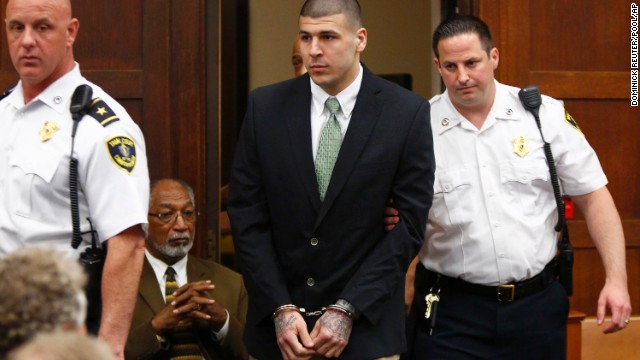 Former New England Patriots tight end Aaron Hernandez is led into the courtroom to be arraigned on homicide charges on Wednesday, May 28, in Boston. Hernandez pleaded not guilty in the 2012 killings of Daniel de Abreu and Safiro Furtado. He has also been charged in the 2013 death of semipro football player Odin Lloyd.
Former New England Patriots tight end Aaron Hernandez is led into the courtroom to be arraigned on homicide charges on Wednesday, May 28, in Boston. Hernandez pleaded not guilty in the 2012 killings of Daniel de Abreu and Safiro Furtado. He has also been charged in the 2013 death of semipro football player Odin Lloyd. 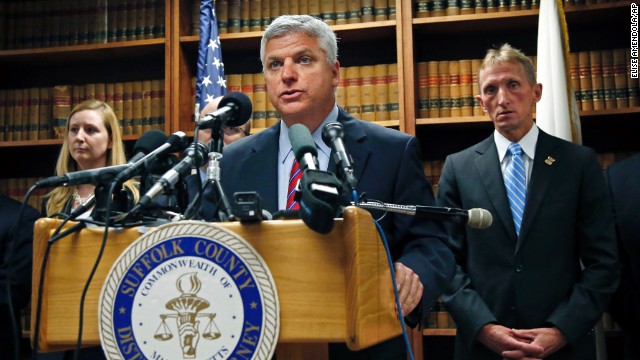 At a press conference on May 15, Suffolk County District Attorney Dan Conley announces that Hernandez has been indicted for the July 2012 killings of de Abreu and Furtado and charged with three counts of armed assault with attempt to murder. Prosecutors allege Hernandez killed de Abreu and Furtado after de Abreu bumped into Hernandez at a nightclub, causing him to spill his drink.
At a press conference on May 15, Suffolk County District Attorney Dan Conley announces that Hernandez has been indicted for the July 2012 killings of de Abreu and Furtado and charged with three counts of armed assault with attempt to murder. Prosecutors allege Hernandez killed de Abreu and Furtado after de Abreu bumped into Hernandez at a nightclub, causing him to spill his drink. 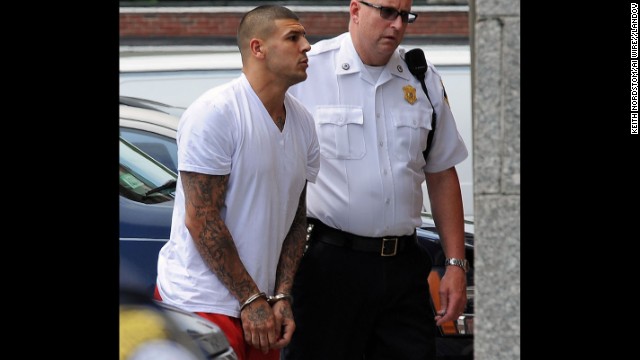 Hernandez is brought into the Attleboro, Massachusetts, District Court for his arraignment on June 26, 2013. He was charged with first-degree murder in Lloyd's death. Hernandez was release by the Patriots less than two hours after his arrest.
Hernandez is brought into the Attleboro, Massachusetts, District Court for his arraignment on June 26, 2013. He was charged with first-degree murder in Lloyd's death. Hernandez was release by the Patriots less than two hours after his arrest. 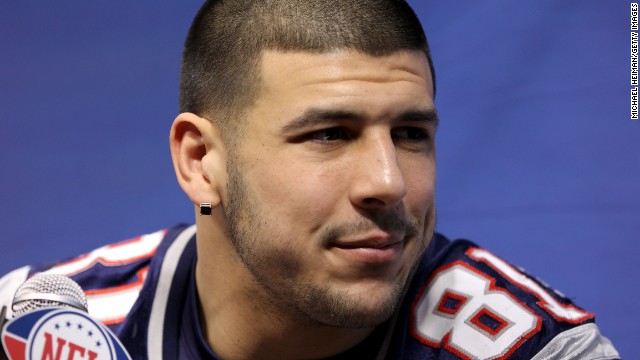 Hernandez answers questions during Media Day on January 31, 2012, before Super Bowl XLVI against the New York Giants in Indianapolis.
Hernandez answers questions during Media Day on January 31, 2012, before Super Bowl XLVI against the New York Giants in Indianapolis. 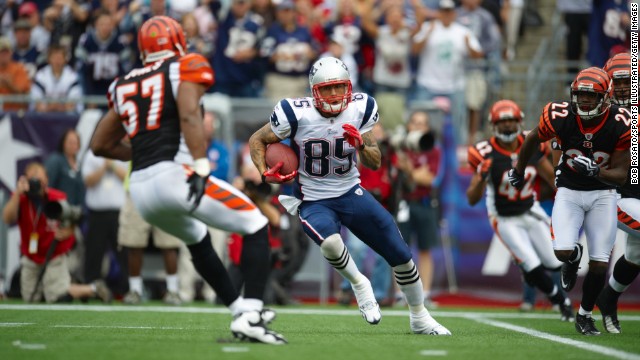 Hernandez carries the ball as the Patriots play the Cincinnati Bengals in Foxborough, Massachusetts, on September 10, 2010.
Hernandez carries the ball as the Patriots play the Cincinnati Bengals in Foxborough, Massachusetts, on September 10, 2010. 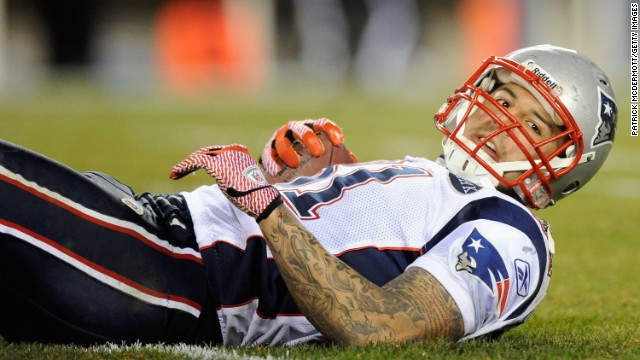 Hernandez looks up after being tackled during a game against the Philadelphia Eagles on November 27, 2011, in Philadelphia.
Hernandez looks up after being tackled during a game against the Philadelphia Eagles on November 27, 2011, in Philadelphia. 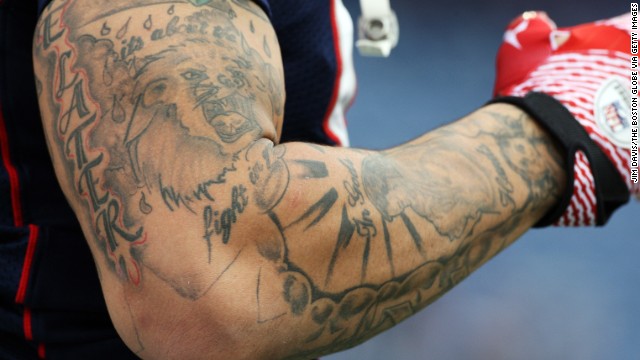 Tattoos on Hernandez's arm are visible during the pregame warmup on December 4, 2011.
Tattoos on Hernandez's arm are visible during the pregame warmup on December 4, 2011. 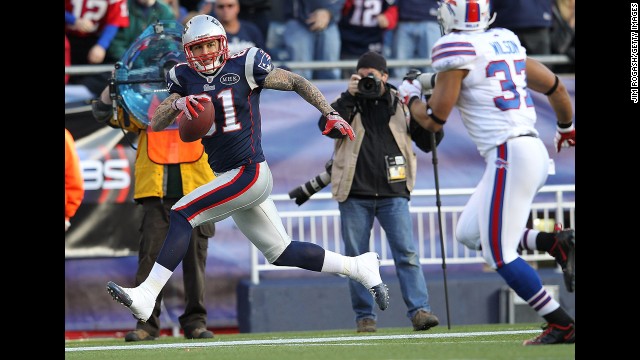 Hernandez scores a touchdown against the Buffalo Bills on January 1, 2012, in Foxborough, Massachusetts.
Hernandez scores a touchdown against the Buffalo Bills on January 1, 2012, in Foxborough, Massachusetts. 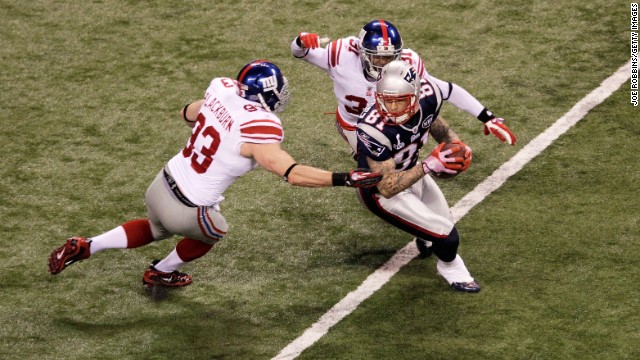 Hernandez catches a pass against Chase Blackburn and Aaron Ross of the New York Giants during Super Bowl XLVI on February 5, 2012, in Indianapolis.
Hernandez catches a pass against Chase Blackburn and Aaron Ross of the New York Giants during Super Bowl XLVI on February 5, 2012, in Indianapolis.  Hernandez runs for a 12-yard touchdown past Deon Grant of the New York Giants in the third quarter of Super Bowl XLVI on February 5, 2012, in Indianapolis.
Hernandez runs for a 12-yard touchdown past Deon Grant of the New York Giants in the third quarter of Super Bowl XLVI on February 5, 2012, in Indianapolis. 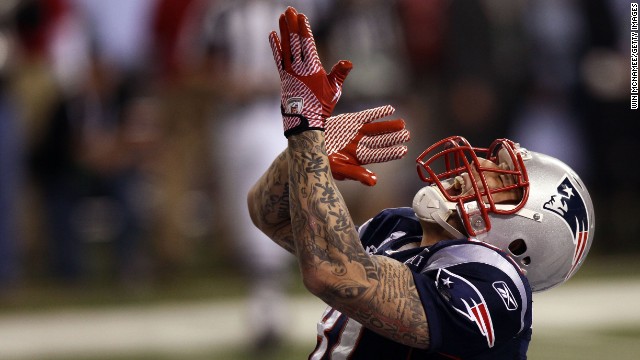 Hernandez celebrates his touchdown in the third quarter of Super Bowl XLVI.
Hernandez celebrates his touchdown in the third quarter of Super Bowl XLVI. 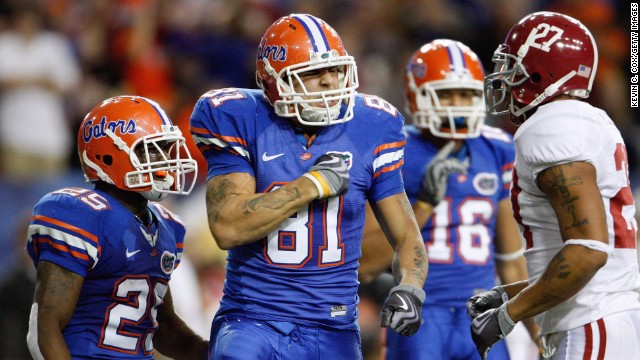 Hernandez, center, reacts during the SEC Championship game between the Florida Gators and the Alabama Crimson Tide on December 6, 2008. The Gators went on to win the national title.
Hernandez, center, reacts during the SEC Championship game between the Florida Gators and the Alabama Crimson Tide on December 6, 2008. The Gators went on to win the national title. Rise and fall of Aaron Hernandez
Rise and fall of Aaron Hernandez
Rise and fall of Aaron Hernandez
Rise and fall of Aaron Hernandez
Rise and fall of Aaron Hernandez
Rise and fall of Aaron Hernandez
Rise and fall of Aaron Hernandez
Rise and fall of Aaron Hernandez
Rise and fall of Aaron Hernandez
Rise and fall of Aaron Hernandez
Rise and fall of Aaron Hernandez
Rise and fall of Aaron Hernandez
 Photos: Rise and fall of Aaron Hernandez
Photos: Rise and fall of Aaron Hernandez Hernandez, then 23, pleaded not guilty in the slaying of Odin Lloyd and is being held in a Massachusetts jail without bail. Hernandez has also been charged in the slayings of two other men, and some of his closest associates are facing serious charges in connection with the alleged crimes.
 Source: Lloyd killed over trivial matter
Source: Lloyd killed over trivial matter  Aaron Hernandez taken to hospital
Aaron Hernandez taken to hospital Friends and fans alike wonder: How could the star player who had more than 900 receiving yards in 2011 now be accused of murdering three people?
From 'golden boy' to behind bars
Long before Hernandez made national headlines, he was a standout athlete in Bristol, Connecticut, who came from a family described as a local sports dynasty.
"I don't think there was another family that was more familiar in Bristol," Bob Montgomery, who covers high school sports for the Bristol Press, told CNN.
The young Hernandez was the "golden boy," playing football, basketball and running track, following in the footsteps of his uncle, older brother and father -- all well-known athletes in the community.
Hernandez's father constantly pushed his son, requiring him to practice for hours before he could go out with friends.
"I saw a closeness with them that I'd never seen before," Montgomery said of the relationship between Hernandez and his father.
But his father, the man who kept the 16-year-old anchored, died from complications after a routine surgery.
Hernandez left high school halfway through his senior year in January 2007 to join the University of Florida Gators, and trouble seemed to follow.
In just his first semester, a police report says Hernandez got into a fight at an off-campus restaurant, sucker-punching the manager and rupturing his eardrum.
The following fall, there was a shooting near a local club. Police reports link Hernandez and several other University of Florida football players to an argument in the parking lot.
Hernandez was one of more than 20 people interviewed by police, and he was the only one who did not make a statement after invoking his right to counsel.
At the time, Hernandez's mother told the Orlando Sentinel newspaper, "I know he was at the club, but he never saw any shooting."
The case remains open, and no one has been charged.
Hernandez was also suspended at least once for marijuana, an issue that would follow him as he entered the draft his junior year.
Trying to put the alleged drug use behind him, Hernandez wrote a letter to the Patriots' director of personnel.
"If you draft me as a member of the New England Patriots, I will willfully submit to a bi-weekly drug test throughout my rookie season. ... In addition, I will tie any guaranteed portion of my 2010 compensation to these drug tests and reimburse the team a pro-rata amount for any failed drug test," he wrote, according to the Boston Globe.
Before the draft, Hernandez was expected to be a first or second round pick. He was passed over until the fourth round, when the Patriots selected him.
By the end of the second season, he was a bona fide star, inking the five-year contract extension worth $40 million.
One month before signing the deal, however, he was partying at a Boston club. That same night, two men from the club were found dead.
Did spilled drink lead to slaying?
Investigators allege Hernandez shot and killed Daniel Abreu and Safiro Furtado on July 16, 2012, because one bumped into him on a nightclub dance floor and spilled his drink.
District Attorney Patrick Haggan described the scene in a Massachusetts courtroom in May, saying Hernandez became "angered and increasingly agitated, particularly after Mr. Abreu smiled and did not apologize."
Prosecutors: Bump, spilled drink led to double homicide
Hernandez's friend tried to calm him down, and the pair walked outside and eventually entered a second club across the street, the prosecutor said. Court documents identify that friend as Alexander Bradley, who would go on to accuse Hernandez of shooting him in the eye in an incident that would take place seven months later.
After leaving the second nightclub, Hernandez and the friend returned to their SUV and pulled over on a nearby street where Hernandez removed a revolver from the engine block, Haggan said.
Hernandez began trailing Abreu, Furtado and three of their friends in his SUV, authorities said.
He then pulled up to the victims' car at a red light and leaned out the driver's side window with a loaded revolver, Haggan told the court.
Hernandez allegedly said, "Yo, what's up now," followed by a racial slur, and fired at least five rounds from a .38-caliber revolver, Haggan said.
Abreu, the driver, was shot several times and fatally hit in the chest. Furtado was sitting in the front passenger seat and suffered multiple gunshot wounds, including one to the head, Haggan said.
Hernandez was charged in the double homicide just last month, and he pleaded not guilty. Investigators found evidence they believe links him to the 2012 slayings while investigating an entirely different case -- the slaying of Odin Lloyd.
Do tattoos provide clues?
The killing of Odin Lloyd
In the early hours of June 17, 2013, Lloyd was shot seven times. The semi-pro football player's body was found by a jogger the next afternoon in an industrial park in North Attleboro, Massachusetts.
Lloyd, who was dating the sister of Hernandez's fiancee, had been partying with Hernandez just before his death, his friends told CNN.
Lloyd's mother: 'Talking to my son in the ground'
Prosecutors say Lloyd was last seen with Hernandez and Hernandez's two associates, Carlos Ortiz and Ernest Wallace, around 2:30 a.m. in a rented silver Nissan Altima.
Surveillance video from security cameras at an industrial park showed an Altima heading toward a secluded area at 3:22 a.m.
At the same time, chilling text messages from Lloyd's phone were sent to his sister telling her he was with "Nfl," adding, "just so u know."
Between 3:23 and 3:27 a.m., workers nearby reported hearing gunshots. At 3:29, a camera showed an Altima pulling into Hernandez's driveway, about a half a mile from the death scene.
Three people got out of the car, and Lloyd was not one of them.
Nine days later, Hernandez was arrested and charged with first-degree murder and other weapon-related charges. He has pleaded not guilty.
Investigators believe Hernandez's simmering anger over two incidents at a nightclub and his apartment led him to allegedly kill Lloyd two nights later, CNN has learned.
One of the incidents involved Lloyd seeing guns and ammunition stored at Hernandez' so-called flop house, his apartment in Franklin, Massachusetts. The other thing that set off Hernandez was a conversation Lloyd had with two men at a club earlier that night, June 14, 2013, a source tells CNN.
The cumulative effect apparently reached a breaking point for reasons that most people would find inconsequential. The source would not say what that was, but compared it to something as insignificant as the spilled drink that allegedly led to the 2012 Boston double slaying.
Lloyd's killing did not involve possible knowledge of that double slaying as investigators previously considered, the source added.
In April, Ortiz and Wallace were also charged in Lloyd's slaying. They, too, have pleaded not guilty.
Life in a jail cell
Today, Hernandez is behind bars in a 7-by-10 foot cell. Sheriff Thomas Hodgson, who runs the jail where Hernandez is incarcerated, says he has talked to inmate No. 174954 at length.
Hernandez, Hodgson says, spends his time reading the Bible and another book he suggested, "Tuesdays With Morrie."
Hernandez taken from jail cell and moved briefly to hospital
Hodgson has encouraged Hernandez to turn to his childhood anchor, his late father. The father-son relationship has come up in their conversations and could have played a role in his checkered past.
"His dad clearly kept him grounded," Hodgson said. "When you lose that person and there's no one there to help you process it in a healthy way, at 16 you're going to reach out to anybody that's older than you to deal with it."

 A Bristol County, Massachusetts, grand jury indicted former NFL player Aaron Hernandez on a first-degree murder charge, as well as five weapons charges, on August 22. The former New England Patriots' tight end was arrested in the shooting death of his friend Odin Lloyd in June. Hernandez has pleaded not guilty. Here's a look at other professional athletes who have been charged with murder. Some have been able to create new lives in the free world. Others are incarcerated.
A Bristol County, Massachusetts, grand jury indicted former NFL player Aaron Hernandez on a first-degree murder charge, as well as five weapons charges, on August 22. The former New England Patriots' tight end was arrested in the shooting death of his friend Odin Lloyd in June. Hernandez has pleaded not guilty. Here's a look at other professional athletes who have been charged with murder. Some have been able to create new lives in the free world. Others are incarcerated.  South African sprinter Oscar Pistorius, seen here in August, is accused of murdering his girlfriend, model Reeva Steenkamp, on February 14, 2013. Pistorius became the first amputee to compete in the able-bodied Olympics when he ran for South Africa in London 2012.
South African sprinter Oscar Pistorius, seen here in August, is accused of murdering his girlfriend, model Reeva Steenkamp, on February 14, 2013. Pistorius became the first amputee to compete in the able-bodied Olympics when he ran for South Africa in London 2012.  Rae Carruth, who was a wide receiver for the Carolina Panthers, became the first active NFL player ever charged with first-degree murder. His pregnant girlfriend, Cherica Adams, was killed in December 1999, and prosecutors said he arranged for her to be killed in a drive-by shooting. Carruth was eventually convicted of conspiring in her murder and is now in prison. The unborn child, a boy, survived.
Rae Carruth, who was a wide receiver for the Carolina Panthers, became the first active NFL player ever charged with first-degree murder. His pregnant girlfriend, Cherica Adams, was killed in December 1999, and prosecutors said he arranged for her to be killed in a drive-by shooting. Carruth was eventually convicted of conspiring in her murder and is now in prison. The unborn child, a boy, survived.  Middleweight boxer Rubin Carter, known as "Hurricane" in the ring, served 18 years in prison for a triple homicide that took place in a bar in 1966. A federal judge overturned his sentence and that of his supposed accomplice, John Artis, in 1985, ruling that the conviction was based on "racial stereotypes, fears and prejudices."
Middleweight boxer Rubin Carter, known as "Hurricane" in the ring, served 18 years in prison for a triple homicide that took place in a bar in 1966. A federal judge overturned his sentence and that of his supposed accomplice, John Artis, in 1985, ruling that the conviction was based on "racial stereotypes, fears and prejudices."  Groundbreaking skateboarder Mark "Gator" Rogowski confessed to beating and raping Jessica Bergsten, then choking her to death and burying her in the desert in 1991. Bergsten was a friend of Rogowski's former girlfriend, and Rogowski testified that he acted out of misplaced anger against his ex. Rogowski was denied parole in 2011 and will not be eligible for parole again until 2018.
Groundbreaking skateboarder Mark "Gator" Rogowski confessed to beating and raping Jessica Bergsten, then choking her to death and burying her in the desert in 1991. Bergsten was a friend of Rogowski's former girlfriend, and Rogowski testified that he acted out of misplaced anger against his ex. Rogowski was denied parole in 2011 and will not be eligible for parole again until 2018.  Baltimore Ravens linebacker Ray Lewis and two others were charged with murder in 2000 after a fight in a popular Atlanta bar district left two men dead on the street. The murder charges against Lewis were dropped after he pleaded guilty to a misdemeanor charge of obstruction of justice and testified against his friends; they were later acquitted. Lewis announced his retirement before helping the Ravens win the Super Bowl in 2013.
Baltimore Ravens linebacker Ray Lewis and two others were charged with murder in 2000 after a fight in a popular Atlanta bar district left two men dead on the street. The murder charges against Lewis were dropped after he pleaded guilty to a misdemeanor charge of obstruction of justice and testified against his friends; they were later acquitted. Lewis announced his retirement before helping the Ravens win the Super Bowl in 2013. 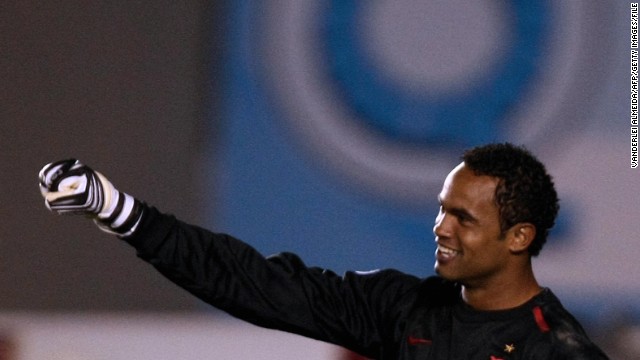 Bruno Fernandes das Dores de Souza, a former goalie for the Brazilian soccer club Flamengo, was convicted in the murder of his ex-girlfriend, a court said in March 2013. He was sentenced to 22 years and three months for the murder of Eliza Samudio, who had disappeared in 2010. Souza, his lover and his ex-wife were among nine people charged with torturing and murdering Samudio, who had been trying to prove Souza had fathered her son.
Bruno Fernandes das Dores de Souza, a former goalie for the Brazilian soccer club Flamengo, was convicted in the murder of his ex-girlfriend, a court said in March 2013. He was sentenced to 22 years and three months for the murder of Eliza Samudio, who had disappeared in 2010. Souza, his lover and his ex-wife were among nine people charged with torturing and murdering Samudio, who had been trying to prove Souza had fathered her son.  Although O.J. Simpson was found not guilty, the former football star's 1995 murder trial has kept him a household name. Simpson was acquitted in the death of his wife, Nicole Brown Simpson, and Ron Goldman. In October 2008, Simpson was sentenced to 33 years in prison on multiple counts, including armed robbery and kidnapping, in connection with a robbery at a Las Vegas hotel in 2007.
Although O.J. Simpson was found not guilty, the former football star's 1995 murder trial has kept him a household name. Simpson was acquitted in the death of his wife, Nicole Brown Simpson, and Ron Goldman. In October 2008, Simpson was sentenced to 33 years in prison on multiple counts, including armed robbery and kidnapping, in connection with a robbery at a Las Vegas hotel in 2007. Athletes charged with murder
Athletes charged with murder
Athletes charged with murder
Athletes charged with murder
Athletes charged with murder
Athletes charged with murder
Athletes charged with murder
Athletes charged with murder
 Photos: Athletes charged with murder
Photos: Athletes charged with murder Even behind bars, Hernandez has found trouble. He has been accused of getting into a physical altercation with another inmate and is facing charges of assault and threatening a guard's life.
That's on top of three murder charges, the lawsuit claiming he shot his friend in the face and three civil suits from the families of his alleged victims, among other things.
New England Patriots added to wrongful death suit
As for the Lloyd case, Hernandez's lawyers contend the circumstantial evidence is full of gaps.
"There's certainly a lot of what I would call smoke. There's no doubt about it," defense lawyer Jamie Sultan said during a June 16 hearing. "But that's not probable cause that he committed murder. And you can't just throw a bunch of stuff against the wall and say that's good enough."
No murder weapon has been found, and while at one point it seemed likely that Ortiz would be a key witness against Hernandez, there are now serious questions about his credibility.
And the text Lloyd sent to his sister? The jury may never hear about it.
"I expect the defense to say that this is hearsay," legal analyst David Frank said.
Hernandez's lawyers and mother declined to be interviewed, but both predict he will be cleared. It's a possibility that haunts Lloyd's loved ones.
"That's my biggest fear," Michael Branch, Lloyd's former coach and mentor, said. "All it takes is one juror."
Susan Candiotti, Laura Dolan and Michelle Rozsa reported this story from Massachusetts. Lorenzo Ferrigno wrote it from New York.